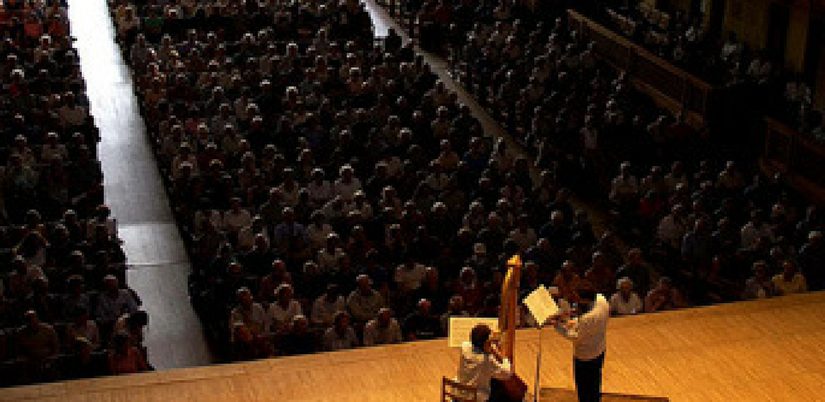I take a yearly trip out to the Berkshires in Eastern Massachusetts, and it has become a summer tradition. As a child, I would hike the hilly woods — taking in the vistas from Cascade Waterfall or Mount Greylock, the point of highest elevation in Massachusetts — with my aunt and uncle.
Now my trips include the area’s many museums, from the Norman Rockwell Museum (complete with his intact studio transported from downtown Stockbridge) to the Clark to my favorite: Massachusetts Museum of Contemporary Music, affectionately known as Mass Moca.
Bang on a Can
This year, I was lucky enough to visit Mass Moca during Bang on a Can’s Summer Music Festival (it coincided with the Tanglewood Festival of Contemporary Music).
Each day students and faculty present recitals in the gallery spaces, culminating in a marathon concert on July 30.
There, I caught a recital by new music pianist extraordinaire Vicky Chow. Chow’s interpretations of piano solo pieces by the Bang on a Can founders Julia Wolfe, Michael Gordon, and David Lang were dynamic and precise. The sheer number of notes was mind-numbing, though I could have done with a few more melodies and a bit less figuration.
Tanglewood Festival of Contemporary Music
All this art and nature set the context for the featured event of the trip, the Tanglewood Festival of Contemporary Music.
In case you’re unfamiliar, Tanglewood is the summer home of the Boston Symphony Orchestra and the Boston Pops Orchestra, which combines the highest level of classical music with the beautiful scenery of the Berkshires.
Once inside, we find our way to Seiji Ozawa hall only to discover that we had just missed the end of the prelude concert. The Tanglewood website had no indication that there was an earlier concert on the program. The only mention was on the ticket stub and even then there was no mention of what would be performed. As it turned out, the prelude consisted of a recital of Olivier Messiaen’s song cycle Hawari.
Although I got my share of music during the evening’s concert, it would have been nice to know about the earlier recital, especially as the work initiates Messiaen’s “Tristan Triology,” continued by the evening’s Turangalila-Symphonie.
Despite the rough start, everything turned up as we settled in. As the last few rain clouds passed by, we stretched out on the lawn and laid out our picnic spread.
The concert kicked off with George Benjamin’s Dream of the Song. The work was a North American premiere for the British composer. Festival director, the late Steven Stucky, selected the pairing to highlight the student-teacher relationship.
The Benjamin piece set was a relatively static meditation. The work meandered through its six movements, with sustained notes in the strings and muted horns.
Each movement presented a new perspective on a similar feeling, bringing to mind the concept of rasa that one finds in Indian classical music. Daniel Moody, the countertenor soloist, sang with a full yet delicate tone, haloed by the Lorelei Ensemble women’s choir. The instrumental effects in the writing clearly bore the marks of Messiaen’s instruction.
The Atmosphere
As the music played, moments matched our picnic. We popped champagne grapes to the sound of staccato strings. Muted horns in dissonant chords matched the complexity of our hard goat’s cheese. And bright, summer cherries enhanced the sweetness of the violins.
The Benjamin work will be featured again in a concert in February — though I’ll miss the edible accompaniment.
After an extended intermission (the amount of setup involved in the Messiaen took about 25 minutes), The Tanglewood Music Center Orchestra got underway with the main showpiece of the night. Weighing in at about 80 minutes in 10 movements, the Turangalila-Symphonie is a serious undertaking.
Luckily the work was in capable hands under the direction of conductor Stefan Asbury. Both the soloists, George Xiaoyuan on the piano and Genevieve Grenier on the ondes martinot, delivered stunning performances.
Messiaen states “This work is a love song.” And what better way to listen to a love song, than with a bottle of wine, under a sky full of stars. The works soaring melodies and complex harmonies delight throughout, intensified by Messiaen’s skillful orchestration and instrumental effects.
Although the scale of the work is large, Messiaen managed to hold the audience captive to the very end, where the “love” theme returned and the orchestra joined in a massive, rousing chord.
There Will Be a Next Time
I would absolutely attend this concert again. The chance to hear a modern masterpiece drew me out to Tanglewood, and did not disappoint. At the same time, to see young musicians drawing a Festival of Contemporary music to a close with a work completed in 1948 highlights what a legacy industry classical music can be.
Here’s to another successful season in the Berkshires and to the hopes of more to come.
Gordon Williams is a composer, musician and educator in the Boston area. He has performed as a soloist with the Gordon College Wind Ensemble (Gordon Jacob’s Concerto for Timpani and Wind Band) and as marimba soloist, premiering a commission for Boston Children’s Chorus’ 10th year anniversary (Three Haiku by Dr. Ellen Gilson Voth). Gordon recently conducted his arrangement of the Finale from Dvorak’s 12th String Quartet- “American” in a summer concert band series.
Gordon believes strongly in the communal benefits of music and has worked with a number of community groups; serving on the board of directors for Ipswich’s Orchestra on the Hill, assistant directing Community Band- Wenham, and performing and conducting with the Ipswich Summer Band. Gordon works in nonprofit arts administration.

